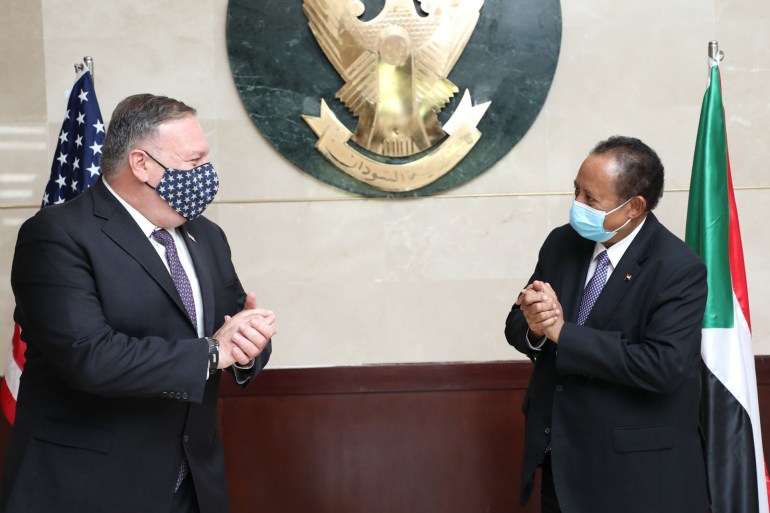An article
in the Washington Post stated that US President Donald Trump's initiative to open up to Sudan appears on the face of a diplomatic victory, but it may backfire.
The article, written by the newspaper's foreign affairs analyst, Ishan Tharoor, said that Trump's announcement last Monday of his intention to remove Sudan from the US list of states sponsoring terrorism is without any doubt good news for this African country that "has been staying for 27 years in it."
He said that the stigmatization of Sudan with terrorism had always prevented his government from dealing in dollars internationally, and had prevented it from attracting foreign investments, aid and loans.
The writer pointed out that according to the White House agreement with Khartoum, Sudan will pay $ 335 million in compensation to the families of the American victims who were killed in the terrorist attacks on the Washington embassies in Kenya and Tanzania in 1998, and in the bombing of the USS Cole in 2000.
Visit Bensouda
He also noted that the Sudanese authorities hosted, earlier this week, a delegation from the International Criminal Court led by its Prosecutor General Fatou Bensouda to discuss scenarios related to the trial of former President Omar Al-Bashir and a number of his aides on charges of crimes against humanity and genocide.
And ironically - and Tharoor continues - the Trump administration recently imposed sanctions on Bensouda and the International Criminal Court.
However, the Prosecutor’s visit to the court to Khartoum does not represent a victory for Washington, as the author of the article wants to suggest.
Washington's priority is the normalization of Sudan with Israel
That's because the prize the White House has in mind is completely different.
Trump and his allies expect that a return to warmth with Sudan will lead to a normalization of his relations with Israel.
For months, diplomats had been arguing in secret about when and how Sudan could join the handful of Arab countries that entered into direct contact with the Israelis.
According to the Washington Post article, the UAE played a major role in mediating in order to encourage rapprochement between Khartoum and Washington, and in persuading the Sudanese to move forward with normalization with Israel.
The symbolic significance of Khartoum's normalization
Tharoor clarified that the symbolism of that step cannot be ignored, given that Khartoum had hosted the Arab summit conference in 1967, following the Arab war with Israel in June of that year.
That conference was famous for the "summit of the Three No": that is, no peace, no recognition, and no negotiation with Israel.
Tharoor: Washington expects that the return of warmth with Sudan will lead to the normalization of its relations with Israel (social networking sites)
Since then, conditions have changed, but Sudan remained a "prominent opponent" of Israel and continued to provide support to "militant" groups operating against Tel Aviv.
Tharoor alleges that the military leaders in Sudan who replaced Bashir in power - including figures accused of having links to war crimes and human rights violations - are often closely allied with the Emiratis and the Saudis.
UAE and Saudi support for Khartoum's generals
The writer attributed in his article to Jean-Baptiste Gallopin of the European Council on Foreign Relations, his assertion that the support of Saudi Arabia and the UAE gave the generals a great space to resist the demands of the Sudanese masses for civilian rule, which established a "skewed balance of power" and made them able to face the mass mobilization.
However, the attempts of civilian politicians - such as Prime Minister Abdullah Hamdok - to manage the democratic transition are still fraught with tension, not least because of a series of new crises ravaging under the yoke of a Sudan already riddled with war wounds.
Yonatan Tuval - a senior analyst at the Israel Institute for Regional Foreign Policy - believes in an article published in Haaretz that Sudanese civilian leaders may prefer to make a clear decision on Israel likely later after Khartoum holds its elections in 2022.
Threat to democratization
And he added that what he described as the Trump administration's bullying against Sudan to get it to quickly normalize relations with Israel, may make the military, on the one hand, and the Islamists, on the other hand, bolder in their handling of the transitional phase.
Tuval believes that the Trump administration, instead of heralding a new era for a prosperous relationship between Sudan and Israel, its "fierce" approach to twisting Khartoum's arm threatens to undermine that country's transition to democratic rule, strengthen the military's influence on civilians, increase the temptation of Islamic groups, and judge Any relationship it has with Israel "with an early and reckless end."
Ishan Tharoor quotes in his article on Zach Vertin, a visiting scholar at the Brookings Institution, that Washington must have already provided Sudan with the kind of political and economic aid needed for the success of the transition period.
Instead, Vertin adds, the Trump administration chose to wait and extort the fragile democratic transition process to serve its domestic political interests.
According to the Washington Post, Trump is moving within a tight timetable, as there are only a few days left for the US presidential elections.
However, observers of the Sudanese issue hope that there will be a change in Washington's approach in this regard.

